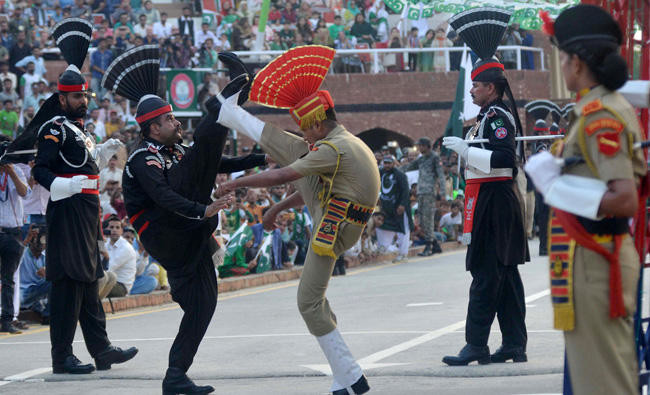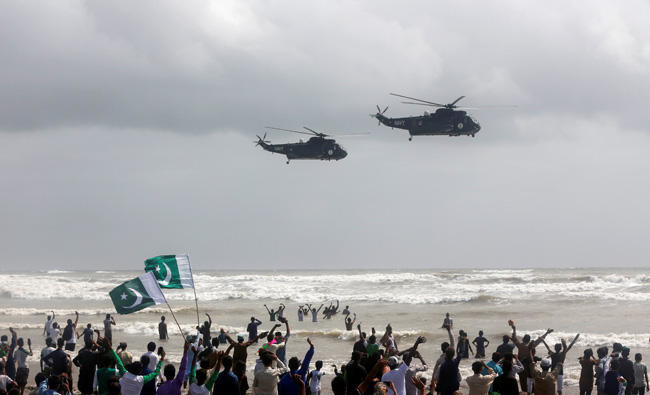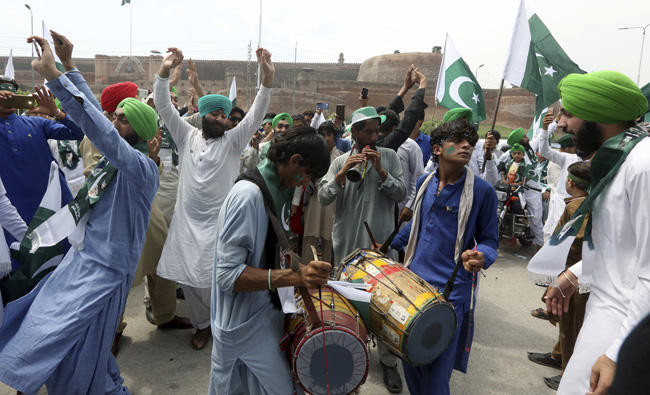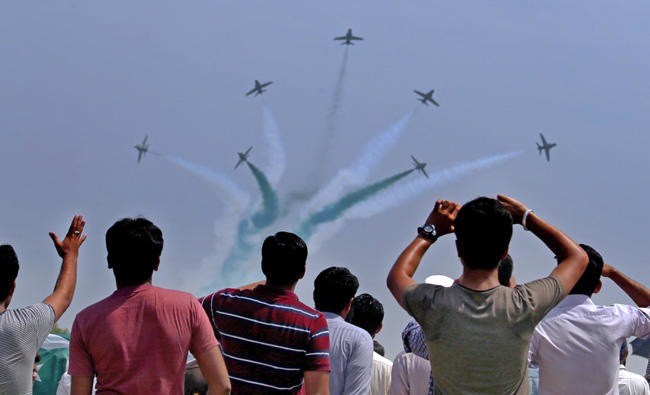ISLAMABAD: Pakistan on Monday celebrated 70 years of independence from British India with a patriotic display including a giant flag and a show of airpower, as the military’s top brass vowed to wipe out terrorists hours before a new bomb attack killed six soldiers.
Celebrations began at the stroke of midnight with firework shows in major cities.
At the highly symbolic Wagah eastern border crossing with India, army chief General Qamar Javed Bajwa raised a massive national flag on a 400 foot (122-meter) pole as crowds chanted patriotic slogans.
Following the chest-thumping performance Bajwa said the country was making progress and promised to “go after each and every terrorist in Pakistan.”
“We have made a few mistakes in the past, but we are on the road to development under the guidance of our constitution,” he added.
Later Monday a roadside bomb in restive Balochistan province’s Harnai district killed six paramilitary soldiers and wounded two others, a spokesman for the troops said. The separatist Baluch Liberation Army claimed responsibility in a telephone call to AFP.
The attack came days after a powerful bomb targeted a military vehicle in the provincial capital Quetta late Saturday, killing 14 people including several troops.
The military later said the blast, claimed by the Daesh group, was intended to mar independence day celebrations.
Pakistan also faces fresh political turmoil after the Supreme Court last month sacked Prime Minister Nawaz Sharif following an investigation into corruption allegations against his family.
In Islamabad his newly-elected successor Shahid Khaqan Abbasi, along with top generals and foreign dignitaries, presided over a 31-gun salute and flag-raising ceremony to mark the holiday.
“The independence that we got 70 years ago was the fruit of the exemplary struggle of our ancestors,” said Abbasi in an address to the nation.
“Thousands of Muslims have made sacrifices for our future and the future of our children.”
Further south in Karachi the day began with a changing of the guard at the mausoleum of the country’s founder Mohammad Ali Jinnah, where politicians and military commanders laid floral wreaths.
The skies above the capital were later streaked with multicolored smoke as the air force hosted Pakistan’s largest air show to date.
Fighter jets criss-crossed over the leafy capital in aerobatic maneuvers as thousands packed shoulder-to-shoulder applauded from a park below. Planes from close allies Saudi Arabia and Turkey also took part.
In Lahore students cruised through the eastern city’s streets on motorbikes waving flags and screaming “Long live Pakistan!“
Up north in the Swat valley near the restive border with Afghanistan celebrations were more subdued, with events at schools canceled due to “prevailing law and order” issues.
In nearby Peshawar, the capital of Khyber Pakhtunkhwa province, Christians held special services at a church and freed doves to mark the holiday.
“Four years back my father and brother died in this church in a suicide attack, but I am still here praying for my beloved country,” schoolteacher Neelam Anwar told AFP.
In August 1947 the British Raj was dismantled with the subcontinent divided into two independent states — Hindu-majority India and Muslim-majority Pakistan.
Millions were uprooted in one of the largest mass migrations in history, with experts estimating at least one million died in the communal violence unleashed by partition.
The carnage sowed the seeds of the acrimony that led to three wars, and generations later this defining moment in the subcontinent’s history is still polarized by nationalism and rancour.
The countries still wrangle over a large part of their shared border, especially in disputed Kashmir. They even recognize their independence from British rule on separate days, with Pakistan claiming August 14 and India celebrating the following day.
Pakistan marks 70 years of independence with fireworks, air show
Pakistan marks 70 years of independence with fireworks, air show

Trump rattles NATO allies as he descends on summit

- The alliance hopes to keep Trump bound to its mutual defense vow by meeting his demand for a headline figure of five percent of GDP on defense spending
THE HAGUE: US President Donald Trump swept into NATO’s Hague summit Tuesday, with allies hoping a pledge to ramp up defense spending will keep the mercurial leader of the military superpower committed to protecting them.
Trump joined leaders from NATO’s 31 other members to kick off the two-day gathering with a dinner hosted by Dutch King Willem-Alexander in the ornate Orange Hall at his royal residence.
The alliance hopes to keep Trump bound to its mutual defense vow by meeting his demand for a headline figure of five percent of GDP on defense spending.
But Trump refused to say he was committed to NATO’s Article Five clause and protecting Europe in comments that will likely rattle his counterparts on the continent.
“Depends on your definition. There’s numerous definitions of Article Five,” Trump told journalists aboard Air Force One. “I’m committed to being their friend.”
To keep Trump on board, NATO members have thrashed out a compromise deal to dedicate 3.5 percent to core military needs by 2035, and 1.5 percent to broader security-related areas such as cybersecurity and infrastructure.
NATO says the military build-up is crucial to deter Russia, which officials warn is rapidly rebuilding its forces depleted by the war in Ukraine and could be ready to attack the alliance in five years.
But it is just as important for keeping Trump engaged as Washington warns it may shift forces from Europe to face the threat from China.
“They’re going to be lifting it to five percent, that’s good,” Trump said. “It gives them much more power.”
But while the promise of more spending could win Trump over, deep divisions remain over the approach to Europe’s key security issue: Russia’s war in Ukraine.
Trump said he would probably meet Ukraine’s President Volodymyr Zelensky while in The Hague, with Kyiv hoping it can avoid a repeat of the pair’s infamous Oval Office bust-up.
European Commission chief Ursula von der Leyen told an audience in The Hague that NATO’s “historic” spending pledge showed that “the Europe of defense has finally awakened.”
Alliance leaders meanwhile — many of whom are struggling to find the money that will be required — lined up to argue that the threats facing the continent required bold steps.
“We must navigate this era of radical uncertainty with agility,” British Prime Minister Keir Starmer said in announcing the UK’s commitment to meet the target.
Starmer on Wednesday will formally announce that his country is buying a dozen F-35A fighters, capable of carrying atomic weapons to support NATO’s nuclear mission.
The purchase marks an expansion of Britain’s nuclear deterrence, which is currently limited to submarine-launched missiles.
A statement late Tuesday from Starmer’s office quoted Rutte as saying: “I strongly welcome today’s announcement,” calling it “yet another robust British contribution to NATO.”
Separately, powerhouse Germany announced plans to hit the 3.5-percent figure for core defense needs by 2029 — six years before the timeline.
At the other end of the scale, Spanish Prime Minister Pedro Sanchez has risked Trump’s ire by insisting his country doesn’t have to meet the five percent target.
For its part, the Kremlin attacked NATO for its “rampant militarization,” with spokesman Dmitry Peskov saying: “This is the reality that surrounds us.”
Since storming back to power, Trump has upended the West’s approach to the three-year conflict by turning his back on Kyiv and opening the door to closer ties with Moscow.
Zelensky was set to play less of a central role than at recent NATO gatherings and will not attend the main working session.
But Ukraine’s president said he would discuss with Trump buying a package of weapons made up mainly of air defenses.
Zelensky would also push Trump on imposing new sanctions on Russia as Moscow has stalled peace efforts being pressed by Washington, Kyiv said.
“There are no signs that Putin wants to stop this war. Russia rejects all peace proposals including those from the US. Putin only thinks about war,” the Ukrainian leader told a defense forum held alongside the summit.
Trump did briefly meet on the sidelines of the summit late Tuesday with Turkiye’s Recep Tayyip Erdogan, who urged “close dialogue” to end the Russia-Ukraine conflict.
Rutte said allies would send the message that support for Kyiv was “unwavering and will persist.”
But despite his insistence that Ukraine’s bid for membership remains “irreversible,” NATO will avoid any mention of Kyiv’s push to join after Trump ruled it out.
Lawsuit challenges billions of dollars in Trump administration funding cuts

- The lawsuit argues the Trump administration has used the clause for the basis of a “slash-and-burn campaign” to cut federal grants
BOSTON: Attorneys general from more than 20 states and Washington, D.C. filed a federal lawsuit Tuesday challenging billions of dollars in funding cuts made by the Trump administration that would fund everything from crime prevention to food security to scientific research.
The lawsuit filed in Boston is asking a judge to limit the Trump administration from relying on an obscure clause in the federal regulation to cut grants that don’t align with its priorities. Since January, the lawsuit argues that the administration has used that clause to cancel entire programs and thousands of grants that had been previously awarded to states and grantees.
“Defendants’ decision to invoke the Clause to terminate grants based on changed agency priorities is unlawful several times over,” the plaintiffs argued. “The rulemaking history of the Clause makes plain that the (Office of Management and Budget) intended for the Clause to permit terminations in only limited circumstances and provides no support for a broad power to terminate grants on a whim based on newly identified agency priorities.”
The lawsuit argues the Trump administration has used the clause for the basis of a “slash-and-burn campaign” to cut federal grants.
“Defendants have terminated thousands of grant awards made to Plaintiffs, pulling the rug out from under the States, and taking away critical federal funding on which States and their residents rely for essential programs,” the lawsuit added.
Rhode Island Attorney General Neronha said this lawsuit was just one of several the coalition of mostly Democratic states have filed over funding cuts. For the most part, they have largely succeeded in a string of legal victories to temporarily halt cuts.
This one, though, may be the broadest challenge to those funding cuts.
“It’s no secret that this President has gone to great lengths to intercept federal funding to the states, but what may be lesser known is how the Trump Administration is attempting to justify their unlawful actions,” Neronha said in a statement. “Nearly every lawsuit this coalition of Democratic attorneys general has filed against the Administration is related to its unlawful and flagrant attempts to rob Americans of basic programs and services upon which they rely. Most often, this comes in the form of illegal federal funding cuts, which the Administration attempts to justify via a so-called ‘agency priorities clause.”
Connecticut Attorney General William Tong said the lawsuit aimed to stop funding cuts he described as indiscriminate and illegal.
“There is no ‘because I don’t like you’ or ‘because I don’t feel like it anymore’ defunding clause in federal law that allows the President to bypass Congress on a whim,” Tong said in a statement. “Since his first minutes in office, Trump has unilaterally defunded our police, our schools, our health care, and more. He can’t do that, and that’s why over and over again we have blocked him in court and won back our funding.”
In Massachusetts, Attorney General Andrea Campbell said the US Department of Agriculture terminated a $11 million agreement with the state Department of Agricultural Resources connecting hundreds of farmers to hundreds of food distribution sites while the US Environmental Protection Agency terminated a $1 million grant to the state Department of Public Health to reduce asthma triggers in low-income communities.
“We cannot stand idly by while this President continues to launch unprecedented, unlawful attacks on Massachusetts’ residents, institutions, and economy,” Campbell said in a statement.
The lawsuit argues that the OMB promulgated the use of the clause in question to justify the cuts. The clause in question, according to the lawsuit, refers to five words that say federal agents can terminate grants if the award “no longer effectuates the program goals or agency priorities.”
“The Trump Administration has claimed that five words in this Clause— ‘no longer effectuates . . . agency priorities’— provide federal agencies with virtually unfettered authority to withhold federal funding any time they no longer wish to support the programs for which Congress has appropriated funding,” the lawsuit said.
US intel says strikes did not destroy Iran nuclear program

- White House Press Secretary Karline Leavitt confirmed the authenticity of the assessment but said it was “flat-out wrong and was classified as ‘top secret’ but was still leaked”
- Israel launched an unprecedented air campaign targeting Iranian nuclear sites, scientists and top military brass on June 13 in a bid to set back Tehran’s nuclear efforts
WASHINGTON: A classified preliminary US intelligence report has concluded that American strikes on Iran set back Tehran’s nuclear program by just a few months — rather than destroying it as claimed by President Donald Trump.
US media on Tuesday cited people familiar with the Defense Intelligence Agency findings as saying the weekend strikes did not fully eliminate Iran’s centrifuges or stockpile of enriched uranium.
The strikes sealed off entrances to some facilities without destroying underground buildings, according to the report.
White House Press Secretary Karline Leavitt confirmed the authenticity of the assessment but said it was “flat-out wrong and was classified as ‘top secret’ but was still leaked.”
“The leaking of this alleged assessment is a clear attempt to demean President Trump, and discredit the brave fighter pilots who conducted a perfectly executed mission to obliterate Iran’s nuclear program,” Leavitt posted on X.
“Everyone knows what happens when you drop fourteen 30,000 pound bombs perfectly on their targets: total obliteration,” she added.
US B-2 bombers hit two Iranian nuclear sites with massive GBU-57 bunker-buster bombs over the weekend, while a guided missile submarine struck a third with Tomahawk cruise missiles.
Trump called the strikes a “spectacular military success” and said they had “obliterated” the nuclear sites, while Defense Secretary Pete Hegseth said Washington’s forces had “devastated the Iranian nuclear program.”
General Dan Caine, the top US military officer, has struck a more cautious tone, saying the strikes caused “extremely severe damage” to the Iranian facilities.
Iran’s government said Tuesday that it had “taken the necessary measures” to ensure the continuation of its nuclear program.
“Plans for restarting (the facilities) have been prepared in advance, and our strategy is to ensure that production and services are not disrupted,” the head of the Atomic Energy Organization of Iran, Mohammad Eslami, said in a statement aired on state television.
An adviser to Iran’s supreme leader, Ayatollah Ali Khamenei, meanwhile said his country still had stocks of enriched uranium and that “the game is not over.”
Israel launched an unprecedented air campaign targeting Iranian nuclear sites, scientists and top military brass on June 13 in a bid to set back Tehran’s nuclear efforts.
Trump had spent weeks pursuing a diplomatic path to replace the nuclear deal with Tehran that he tore up during his first term in 2018, but he ultimately decided to take military action.
The US operation was massive, with Caine saying it involved more than 125 US aircraft including stealth bombers, fighters, aerial refueling tankers, a guided missile submarine and intelligence, surveillance and reconnaissance aircraft.
US puts up reward for American detained in Afghanistan

WASHINGTON: The United States on Tuesday offered a $5 million reward for information to find a US citizen who it said was abducted in Afghanistan in 2022.
Mahmood Shah Habibi, who worked for a telecommunications firm and holds dual nationality, was abducted along with his driver in Kabul and detained by the Taliban government’s intelligence service, the State Department said.
“Since that time, the so-called Taliban government has not yet provided any information about Mr. Habibi’s whereabouts or condition,” State Department spokeswoman Tammy Bruce told reporters.
In January, the Taliban government released two other Americans, Ryan Corbett and William McKenty, for an Afghan detained in the United States in an exchange mediated by Qatar.
Dozens of foreign nationals have been arrested since the Taliban returned to power in August 2021 following the withdrawal of the US military.
Tiny Greek island appeals for help after migrant increase

- Migrants leaving Libya hope to reach the European Union and follow instructions from people-smugglers, who for the past few months have been directing them to Crete and tiny Gavdos
- Gavdos lies off the southern coast of neighboring Crete and is about 300 kilometers (186 miles) from the Libyan city of Tobruk across the Mediterranean Sea
ATHENS: Greece’s southernmost island is facing a significant increase in migration from Libya, its mayor said on Tuesday, warning it does not have the means to cope.
Lilian Stefanakis said the rise was “a heavy burden” for Gavdos, which is just 30 square kilometers (11.5 square miles), has 70 residents off-season and only a handful of shops.
Gavdos lies off the southern coast of neighboring Crete and is about 300 kilometers (186 miles) from the Libyan city of Tobruk across the Mediterranean Sea.
“We don’t have the capacity to manage these flows,” Stefanakis told Greek public radio Ert. “Institutional solutions must be found.”
According to the port police, 7,300 migrants have arrived on Crete and Gavdos since the start of this year compared to 4,935 for the whole of 2024.
Since the start of this month, 2,550 arrivals have been recorded.
Migrants leaving Libya hope to reach the European Union and follow instructions from people-smugglers, who for the past few months have been directing them to Crete and tiny Gavdos.
Crete does not have any camps to register asylum seekers and offers only emergency shelters for migrants before they are transferred to mainland Greece.
“The smugglers will not set the rules,” Greek Prime Minister Kyriakos Mitsotakis said on Monday, promising to raise the issue about increased migration flows from Libya at the next European summit.
“Navy ships will be sent outside Libya’s territorial waters in order to control illegal migrant flows,” he added.
Government spokesman Pavlos Marinakis later clarified that two military frigates would be sent.
Stefanakis said a vessel from the European Union’s border agency Frontex was deployed and called for further reinforcement on the island.
The northeastern islands in the Aegean Sea opposite Turkiye have traditionally been entry points to Greece and Europe for undocumented migrants and camps have been built.


























